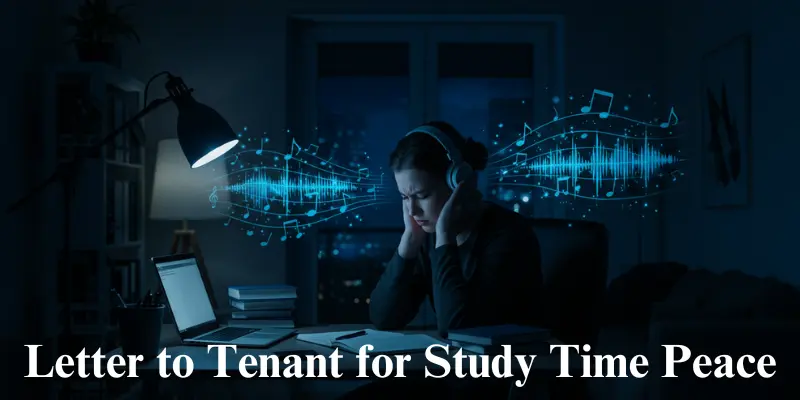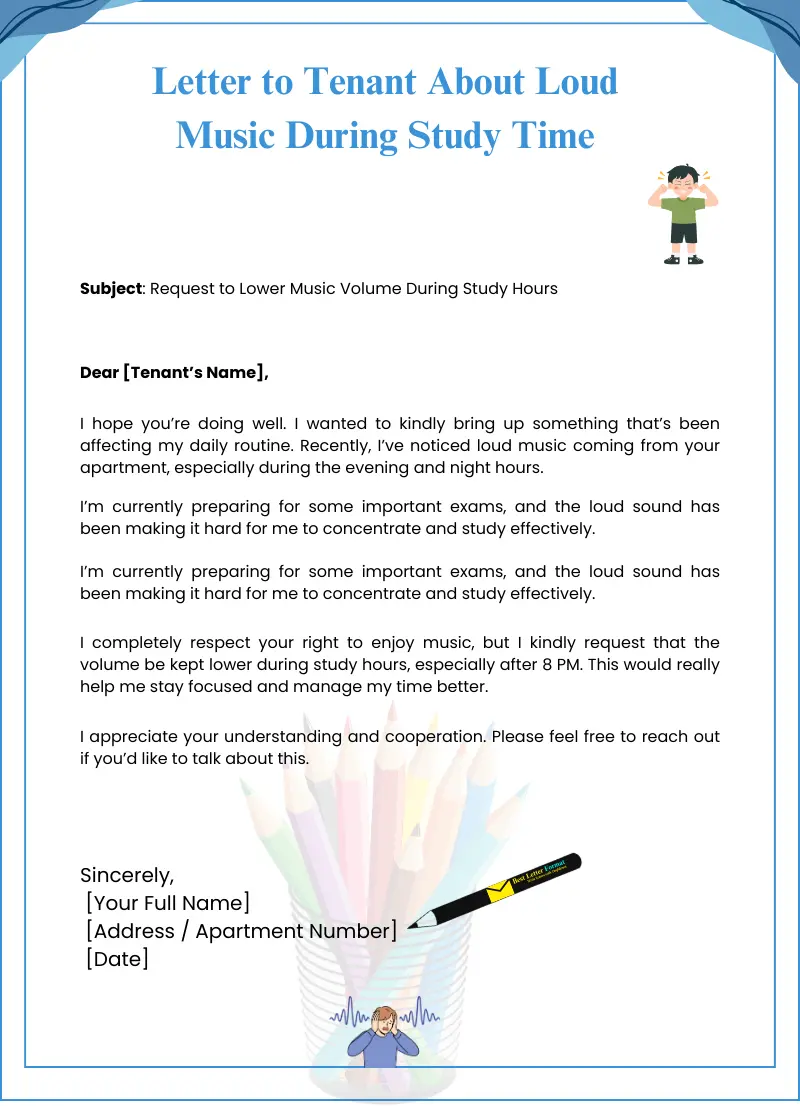How to Write a Letter to Tenant About Loud Music – With Letter Templates
Published: 6 Apr 2025
There’s a certain kind of comfort in coming back home after a long day — the feeling that this is your space, your silence, your place to breathe. But what happens when that peace is replaced by loud beats echoing through your ceiling? You’re tired, you need rest, or maybe you’re sitting down to prepare for an important exam, but the music from your upstairs tenant just won’t stop.
It begins as a small distraction, but soon, it turns into daily frustration. Conversations don’t help. The noise keeps returning, and you’re left wondering what you can do next — calmly, respectfully, and without escalating things.

That’s where a letter to the tenant about loud music can become your best tool. It’s not just about complaining — it’s about expressing your need for peace in a way that’s clear, polite, and effective.
In this article, we’ll explore why writing a letter works better than direct confrontation and how noise affects your study time and sleep schedule. You’ll get two detailed and ready-to-use letter templates — one when music is disturbing your ability to focus and another when it’s making it hard to get the sleep your body needs.
By the end, you’ll be fully equipped to handle the situation wisely and protect your comfort — without creating unnecessary conflict.
Let’s begin.
1. Why a Letter is Better Than Confrontation
Sometimes, you might want to knock on the door and shout, “Turn it down!”
But that rarely leads to lasting change.
A written letter gives you:
- Control over your words – no risk of saying something in anger
- Time to express your feelings clearly
- A polite, professional tone that encourages understanding
- Proof of communication, in case things escalate in the future
People often don’t realize their actions are disturbing others — until you tell them respectfully.
2. Common Scenarios Where Noise Becomes a Problem
Let’s break this down into two very real, relatable experiences:
1. When You’re Trying to Study
Maybe you’re a student preparing for final exams. Or a working professional attending online training courses. You set your environment up perfectly — and then loud music ruins your flow.
It’s not about hating music — it’s about needing silence to stay focused.
2. When You Just Want a Good Night’s Sleep
After a long day, sleep is all your body asks for. But if the music keeps going late into the night, sleep becomes a struggle. This doesn’t just cause frustration — it affects your health, mood, and productivity the next day.
3. How to Politely Tell a Tenant to Lower the Volume
Before we jump into the letters, remember a few key principles:
- Keep your tone respectful and calm
- Avoid sounding accusatory or aggressive
- Mention specific times the noise was a problem
- State how it affects your daily life
- Suggest a reasonable solution (like reducing volume after 8 or 10 PM)
- Let them know you’re open to communication
Now, let’s look at the two templates…
4. Template 1: Letter to Tenant About Loud Music During Study Time
Subject: Request to Lower Music Volume During Study Hours
Dear [Tenant’s Name],
I hope you’re doing well. I wanted to kindly bring up something that’s been affecting my daily routine. Recently, I’ve noticed loud music coming from your apartment, especially during the evening and night hours.
I’m currently preparing for some important exams, and the loud sound has been making it hard for me to concentrate and study effectively.
I completely respect your right to enjoy music, but I kindly request that the volume be kept lower during study hours, especially after 8 PM. This would really help me stay focused and manage my time better.
I appreciate your understanding and cooperation. Please feel free to reach out if you’d like to talk about this.
Sincerely,
[Your Full Name]
[Address / Apartment Number]
[Date]

5. Template 2: Letter to Tenant About Loud Music Disturbing Sleep at Night
Subject: Concern About Loud Music at Night Disturbing Sleep
Dear [Tenant’s Name],
I hope everything is going well with you. I’m writing to share a concern that I’ve been experiencing lately. I’ve noticed that music is often played loudly from your apartment during the late-night hours.
The sound levels have been disturbing my sleep, and it’s been difficult to rest properly. Getting good sleep is important for health and daily functioning, and the current situation has been making it quite challenging.
I would really appreciate it if you could reduce the volume during nighttime, especially after 10 PM. Your cooperation would mean a lot and would help keep our living space peaceful for everyone.
Thank you so much for your understanding. Let me know if you’d like to talk about it further.
Sincerely,
[Your Full Name]
[Address / Apartment Number]
[Date]
6. What to Expect After Sending the Letter
In most cases, a letter like this opens a door to better understanding. Your tenant may not have realized how far the sound travels, and a written note helps them take your concern seriously without feeling attacked.
Many people actually appreciate a letter over confrontation because:
- It shows respect
- It’s non-aggressive
- It gives them a chance to fix the problem quietly
7. Tips to Keep Things Peaceful Moving Forward
- Keep a copy of the letter for your records
- Be consistent — if the problem continues, follow up
- Stay polite, even if the issue doesn’t change instantly
- If needed, involve a property manager or HOA — but only after giving your tenant a chance to respond
FAQs About Writing a Letter to a Tenant About Loud Music
Writing to a tenant about loud music can bring up many doubts — from what to say to how to say it without causing tension. In this section, we’ve answered the most common and practical questions people face when trying to handle noise issues through written communication.
You can politely request your tenant to lower the volume by writing a respectful letter. Mention how the noise affects your daily routine and ask for a small change in behavior, like reducing the volume after certain hours.
Yes, a letter is often more effective. It gives you time to express your concerns clearly and respectfully without emotions getting in the way. It also serves as written proof if needed later.
Your letter should include:
- Specific times the noise is a problem
- How it’s affecting your life (sleep or study)
- A polite request for reducing volume
- Willingness to talk or find a solution
Absolutely. Even if the music is only loud at night, it can disturb sleep and affect your health. A calm letter explaining this is a respectful way to ask for peace.
If the noise continues after your letter, you can follow up with a second letter or involve the landlord or property manager. Always stay polite and keep records of communication.
Yes, many places have noise ordinances or quiet hours (often after 10 PM). If your tenant is breaking these rules, you have every right to bring it up — politely but firmly.
Use a calm tone, be specific about the problem, and clearly express how it affects you. You don’t need to be aggressive to be taken seriously — just honest and respectful.
Yes! Using ready-made letter templates saves time and ensures your message is clear. Our article includes two helpful templates — one for study issues, one for sleep disruption.
Send the letter during the day when the tenant is more likely to be calm and available to read it. Avoid sending it in the heat of the moment or late at night.
In most cases, yes. People often don’t realize they’re disturbing others until it’s pointed out politely. A letter can open the door to understanding without conflict.
Conclusion
Everyone deserves peace in their own home — whether it’s to focus on studies or get a good night’s rest. When that peace is regularly disrupted by loud music, especially from a neighbor or tenant, the best way to respond isn’t with anger — it’s with clarity, calm, and communication.
As we’ve explored in this article, writing a letter to the tenant about loud music is often the most respectful and effective step you can take. Instead of creating conflict, it shows you value understanding and want to maintain harmony in your living environment.
Here’s what we’ve covered:
- Why written letters are better than face-to-face confrontation
- How loud music affects focus and sleep
- Two professionally written letter templates for real-life situations
- What to expect after sending the letter
- Tips to keep things respectful and peaceful in the long term
Sometimes, all it takes is one thoughtful message to make someone realize the impact of their actions.
If you found this guide helpful, please take a moment to share it with others who might be going through the same issue.
If you’ve faced a similar situation, leave a comment below — your experience might help someone else take that first step.
Looking for more helpful letter templates? Browse through our blog — we’re here to help you say it right, every time.

- Be Respectful
- Stay Relevant
- Stay Positive
- True Feedback
- Encourage Discussion
- Avoid Spamming
- No Fake News
- Don't Copy-Paste
- No Personal Attacks

- Be Respectful
- Stay Relevant
- Stay Positive
- True Feedback
- Encourage Discussion
- Avoid Spamming
- No Fake News
- Don't Copy-Paste
- No Personal Attacks








